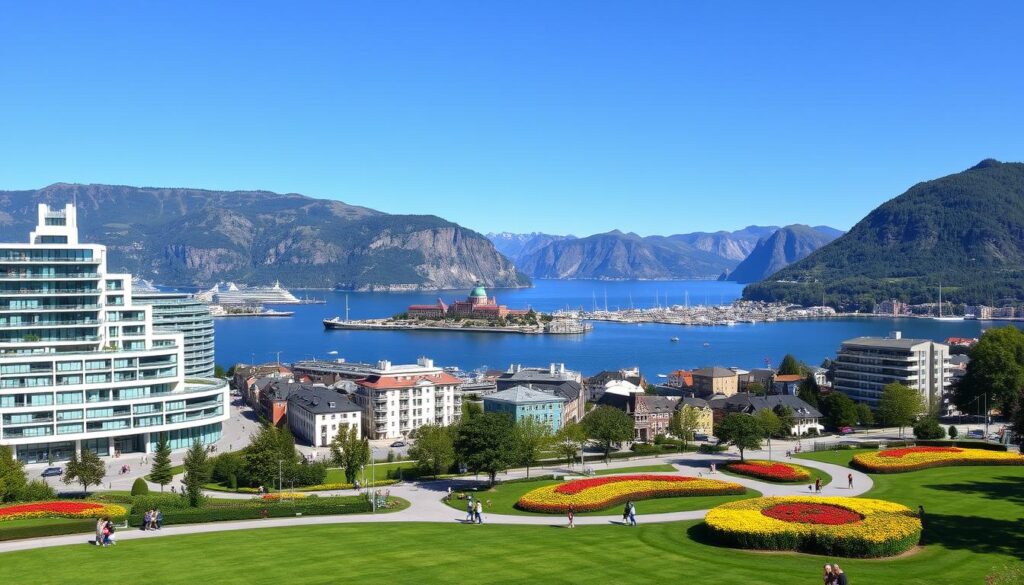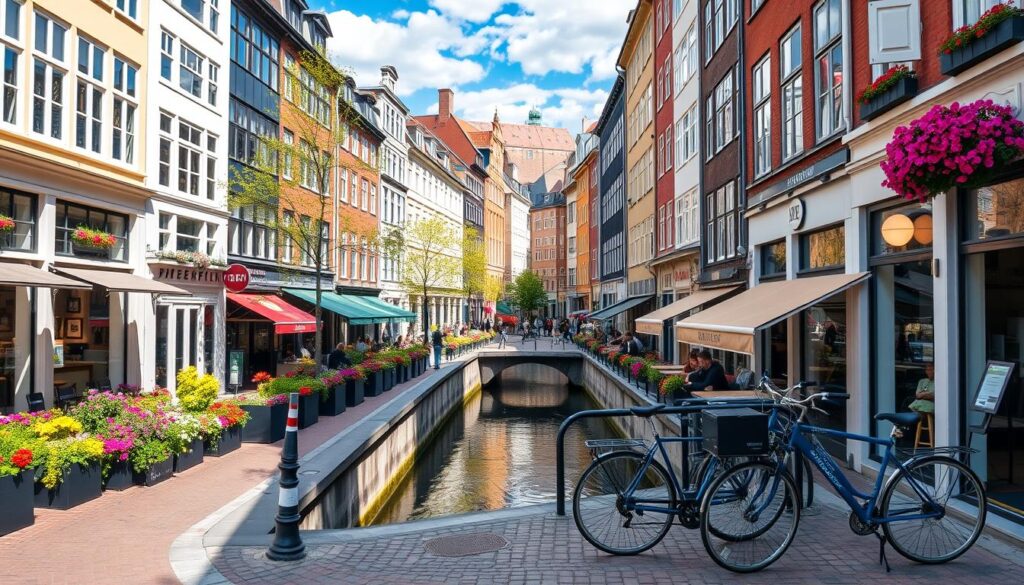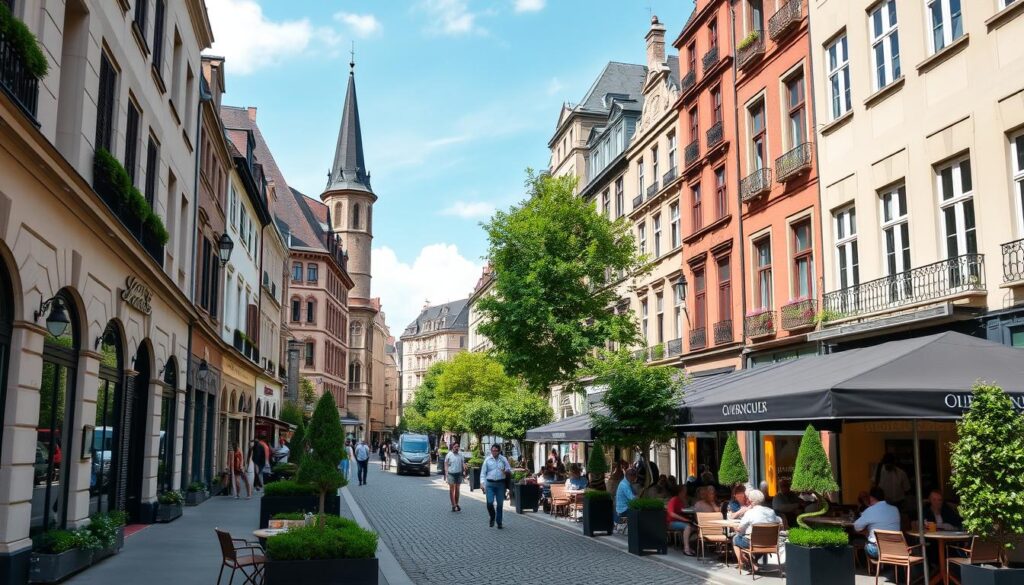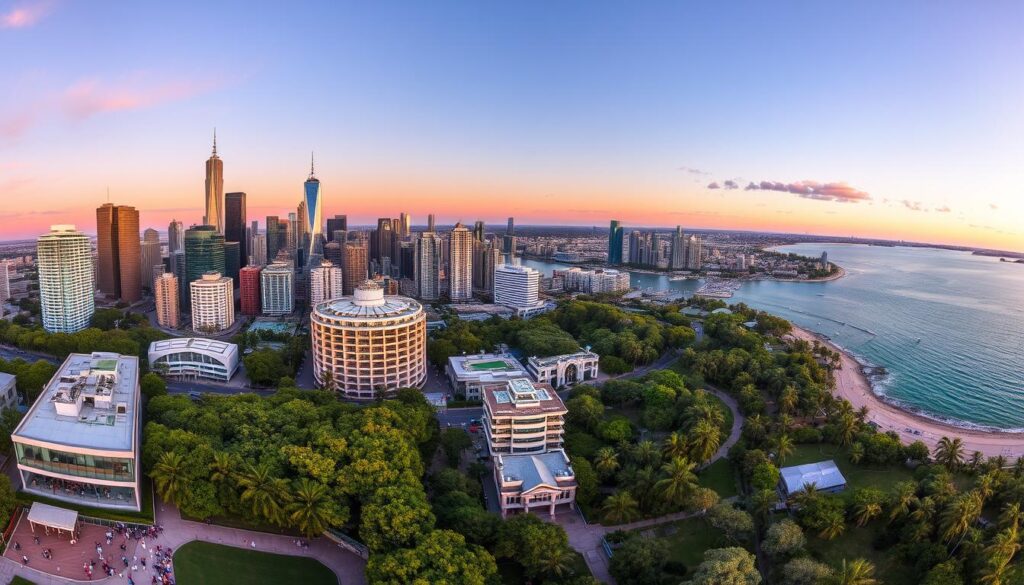Last Updated on: 24th January 2025, 01:02 pm
The landscape of the most expensive countries to live in for 2025 reveals intriguing insights into high expenses and luxury living. From the enchanting streets of Monaco, where the monthly cost of living reaches a staggering $3,743, to the stunning vistas of Iceland and Switzerland—both known for appearing on multiple lists of affluent nations—this ranking illustrates just how varied the cost of living can be across the globe12. Economic hubs like Norway, which has a monthly living cost around $2,074, and the United States, presented at $1,951, further highlight the significant financial considerations facing residents in these regions12. By comparing these costs to a baseline like New York City, serving as a reference point with a 100% living index, we can better grasp the economic realities for those dreaming of relocating to these luxurious locations1
Key Takeaways
- Monaco tops the list with a monthly living cost of $3,743.
- Switzerland and Iceland consistently rank on multiple expense lists.
- Norway’s housing and essentials amount to $2,074 monthly.
- New York City serves as a cost comparison baseline.
- The United States ranks among the top 10 with $1,951 in monthly expenses.
Introduction to Living Expenses
Understanding living expenses is essential for anyone contemplating relocation or travel. These expenses encompass all costs associated with maintaining a household, which includes housing, utilities, food, transportation, and healthcare. In affluent nations, the cost of living typically rises significantly, often attributed to factors such as high taxes and expensive housing markets. Globally, countries like Singapore and Monaco lead the pack, with monthly living costs nearing $3,585 per month for foreign residents3 and well over $2,000 in Singapore4.
The disparity in these expenses can heavily influence lifestyle choices, emphasizing the allure of a lavish lifestyle in places where the cost of living is paired with high salaries. Countries with the highest costs often coincide with higher local purchasing power, allowing residents to enjoy a higher quality of life while managing their finances effectively5. For instance, Switzerland boasts a cost of living index of 101.1, indicating it is significantly costlier compared to many other economies5.
Overall, evaluating living expenses involves not just the direct financial impacts, but also the associated benefits, opportunities, and lifestyle variations that come with higher costs in certain regions. As nations compete for global recognition, understanding these dynamics becomes critical for making informed choices regarding property investments and career opportunities in different markets.
The Rising Cost of Living Globally
The global landscape of living expenses is shifting, with rising costs becoming a significant concern for residents in many countries. The cost index for Bermuda stands remarkably high at 144.1 while showcasing an average monthly income of $11,220, leading to a purchasing power index of 116.46. Affluent nations, often termed wealthy economies, are witnessing similar trends. Switzerland, ranking fourth, has a cost index of 126.1 with an average monthly income of $7,930, but its purchasing power index is at 94.06. The United States, on the other hand, is experiencing notable inflation issues, with 67% of employees reporting that rising costs outpace their wages in 2025, up from 58% in 20217.
This situation raises questions concerning the affordability of various aspects of life, particularly in pricey destinations like Hong Kong and Monaco, where soaring housing prices detract from quality living7. Norway, ranking 20th with a cost index of 90.8, balances its high wages, averaging $8,538 monthly, against the backdrop of rising shelter prices which increased by 12% year-over-year7. Hence, as inflation rates rise globally, the interaction between average income and living costs in these wealthy economies can dramatically influence the overall quality of life for many individuals.
Switzerland: The Pinnacle of Luxury Living
Switzerland stands at the forefront of luxury living, recognized globally for its exorbitant living expenses and unparalleled quality of life. With a Cost of Living Index of 122.4, it is established as the most expensive country to reside in, reflecting the extraordinary costs associated with housing, groceries, and general living standards8. The average monthly living cost for a family of four is a staggering CHF 7,078, while an individual can expect to spend approximately CHF 4,190. Such high costs largely stem from steep housing prices, where rents typically range from CHF 2,000 to CHF 3,000, and grocery bills can average between CHF 800 and CHF 1,0009.
Cost of Monthly Living in Switzerland
Monthly living expenses in Switzerland can far exceed those in many other countries, occasionally reaching prices that are 30% higher than those in London10. In addition to expensive housing, residents face increased costs for essential items and services, contributing to Switzerland’s esteemed yet costly lifestyle. With high wages designed to compensate for these living expenses, many find that the overall value aligns with their expectations of luxury living in this picturesque country.
Opportunity and Quality of Life in Switzerland
Beyond the high costs, Switzerland is renowned for its vast opportunities in sectors such as finance and technology, alongside a robust economy driven by an impressive GDP per capita of USD 106,0009. The country prides itself on stellar healthcare, top-tier educational systems, and remarkable safety ratings, all contributing to an exceptional quality of life that attracts expats and affluent families alike. Such factors make living in Switzerland a coveted experience, offering both a secure environment and luxurious lifestyle.
Norway: High Wages and High Expenses

The allure of Norway often draws attention to its attractive lifestyle, yet living in this Scandinavian nation comes with a hefty price tag. The average monthly expense in Norway ranges from 20,000 to 40,000 NOK ($2,176–4,352) depending on various factors, including location and lifestyle choices11. Major cities like Oslo, Bergen, and Trondheim are known for their high living costs, with monthly expenses without rent fluctuating between 13,135 and 52,545 NOK11.
Cost of Housing and Essentials in Norway
Housing is a significant factor in Norway’s expensive living conditions, as average rent prices vary from 9,967 to 12,517 NOK monthly in the main cities11. The basic utility cost for an 85 square meter apartment hovers around 1,571 NOK per month, further contributing to the overall living expenses11. Food items, too, reflect Norway’s expensive living scenario; for instance, a liter of milk costs approximately 21.90 NOK while a bottle of wine can reach about 150 NOK11. Groceries in Norway are around 27% pricier than in the U.S12., implying a substantial hit to the budget for everyday essentials.
Social Benefits and Quality of Life
Despite these high costs, Norway’s residents benefit from strong social services that enhance quality of life. Public healthcare is accessible, albeit with an annual deductible of approximately 2,040 NOK for individuals over 1611. Education in Norway is also free, including higher education, providing substantial financial relief to families11. The local purchasing power index is 83.11, suggesting a somewhat reduced capacity to afford goods compared to other countries12. This unique combination of high wages and extensive social benefits continues to draw many people to Norway, despite the known challenges of expensive living12.
Iceland: Stunning Scenery at a Premium Cost
Living in Iceland comes with breathtaking views and a unique lifestyle, but it also entails a significant premium cost. The average monthly cost of living in this Nordic island nation is around $2,207, influenced by various factors including accommodation prices and grocery expenses. Rent typically ranges between ISK 180,000-250,000, while grocery bills can reach ISK 60,000-80,000 monthly, making overall living expenses on the higher side13. The remote location of Iceland leads to higher prices for imported goods, contributing to a noticeably more expensive living environment.
Cost of Living Breakdown in Iceland
Iceland is regarded as the fifth most expensive country in the world, which is evident in various aspects of daily expenses14. For instance, hotel prices in Reykjavik can be 10-32% more expensive than in other Nordic capitals. Restaurant and lodging costs exceed the EU average by a whopping 44%, and the price of alcoholic beverages can soar to 123% above the standard13. Accommodation costs vary greatly: budget hotels average between $138 and $220 for single rooms, while luxury options can exceed $1,500 for suites15.
Perks of Living in Iceland
Despite the high premium cost, Icelanders enjoy numerous benefits. The country boasts a low crime rate, ranking among the safest in the world. The stunning natural beauty is complemented by a vibrant cultural heritage, making it an appealing place for those who can afford the higher living expenses13. Additionally, the prevalence of cashless transactions signifies a modern and convenient lifestyle. With grocery stores like Netto and Bonus acting as budget-friendly options, residents can navigate the high costs more effectively15.
Denmark: A Scandinavian Paradise

Denmark, known for its high standard of living, stands out as one of the world’s most expensive nations. Living in this Scandinavian paradise results in elevated expenses, with average rents for apartments ranging from DKK 8,000 to DKK 12,000 monthly16. Grocery bills can amount to DKK 3,000 to DKK 5,000 per month, adding to the financial responsibilities17.
The Danish welfare system plays a critical role in mitigating some of these high costs. It provides free healthcare and education to all residents, ensuring access to essential services without the burden of hefty bills16. The high taxes that support this welfare system are often justified by the comprehensive benefits citizens receive, making Denmark not only costly but also an attractive place to call home17.
Furthermore, Denmark boasts an impressive work-life balance coupled with one of the highest average salaries in Europe, which helps to offset some of the high costs of living16. The combination of a strong economy and a robust welfare structure empowers residents to enjoy a quality of life that many seek to emulate.
Singapore: An Economic Powerhouse
Singapore stands out as an economic powerhouse, having made significant strides since its independence in 1965. The city-state has transformed from a former British colony with minimal resources into a major manufacturing and financial center. This transformation has not only spurred economic growth but has also placed Singapore among the top 10 most expensive countries to live in 202518.
Cost of Living in Singapore Compared to Other Nations
The cost of living in Singapore is notably high, averaging S$1,546 per month for an individual19. Housing expenses are a substantial part of this financial burden, with rent prices varying between SGD 2,000 to 4,00019. In the latest Worldwide Cost of Living Index by EIU, Singapore and Zurich were identified as the most expensive cities globally in 202520. Such rising living costs often lead to affordability concerns among residents, especially as grocery prices have seen the fastest increases20.
Benefits of the Singaporean Economy
Despite high living costs, the benefits of the Singaporean economy attract expatriates and professionals from around the world. It boasts world-class infrastructure, a robust healthcare system, and a highly valued education system18. This stable economy features low taxes and few capital restrictions, enhancing its appeal to businesses and investors. Additionally, Singapore’s economic model is praised for providing effective social services like housing and healthcare, although challenges such as inequality persist18. Living in Singapore is often associated with a high standard of living, showcasing the prosperity initiated by the late leader Lee Kuan Yew18.
Luxembourg: A Wealthy Gem in Europe

As one of the most affluent nations in the world, Luxembourg boasts remarkable living expenses driven by its status as a hub for wealthy economies. This small yet prosperous country features a strong financial sector contributing to its impressive GDP per capita, which exceeds $143,000, the highest globally21. With a GNI per capita of $89,200, it’s clear that living in Luxembourg comes with both economic advantages and considerable costs21.
Housing Market and Living Expenses in Luxembourg
The housing market in Luxembourg is notably competitive, with average rental prices ranging from €1,500 to €2,50021. Individuals face living expenses averaging around €942.80 monthly, whereas families can anticipate expenses of about €3,27621. Such costs reflect Luxembourg’s overall economic affluence, marked by high salaries and a vibrant job market. The local lifestyle, characterized by convenience and quality services, plays a pivotal role in attracting professionals from around the globe to this wealthy gem in Europe.
Hong Kong: Asia’s Financial Capital
Hong Kong is renowned as Asia’s financial capital, presenting both opportunities and challenges for residents and expatriates. Living in this vibrant metropolis comes with a hefty price tag, making the cost of living a crucial aspect for anyone considering a move here. The average rental price ranges from HKD 15,000 to HKD 30,000 per month, alongside grocery expenses that can add another HKD 3,000 to HKD 5,000 to the monthly budget. Hong Kong consistently ranks as the most expensive city in the world for international employees, as recently highlighted in Mercer’s 2025 Cost of Living survey, which underscores the competitive housing market, high transportation costs, and pricier goods and services driving up the overall cost of living2223.
Cost of Living Analysis in Hong Kong
The cost of living in Hong Kong continues to be a significant deterrent for some, while others see the value in the offerings of this dynamic city. With an increased Consumer Price Index (CPI) of 105.20 points in April 2023, up from 105 points in the previous month, the cost of goods reflects an ongoing inflationary trend24. For expats, navigating the financial landscape entails more than just housing; entertainment, dining, and transportation services also contribute to a monthly budget that can easily surpass HKD 50,000 for a comfortable lifestyle.
Life in Hong Kong for Expats
Despite the high costs associated with living in Hong Kong, many expatriates are attracted to its vibrant lifestyle and global business opportunities. The city’s excellent public transport network, coupled with its multicultural environment, fosters a uniquely integrated experience for international residents. Job opportunities, particularly in finance and commerce, are plentiful, further enhancing Hong Kong’s status as a desirable destination22. Those who can adapt to the soaring cost of living are often rewarded with a rich cultural experience and the chance to connect with professionals from around the globe.
Australia: Expensive Cities and Quality of Life

Australia boasts some of the most expensive cities in the world, particularly Sydney and Melbourne. Sydney has a staggering median house value of almost $1.4 million, making it a prime example of high housing costs that propel living expenses upward25. In contrast, Canberra, the second most expensive city, has a median house value of $968,248 and a median unit value of $586,89125. The cost of living in Australia for an average household is approximately $100,000 per year, which includes weekly expenditures of around $2,200, covering everything from housing costs to food26.
Property values in cities like Brisbane have soared by 50.2% since March 2020, showing that the trend of expensive living isn’t confined to just a few cities25. Even Melbourne, previously less expensive, now has median property prices at around $780,457, although there was a slight decrease of 0.1% in January25. The average expenses for a household can be driven by factors such as high rental rates; for instance, an average apartment’s utilities cost about $220 per month26.
Despite these high costs, Australia’s lifestyle offers breathtaking natural landscapes and a favorable climate. Many residents find the quality of life appealing enough to justify the expenses. The allure of cities with a plethora of amenities, alongside high demand for properties, contributes to the enduring appeal of living in such expensive cities2526,).
| City | Median House Value | Food Prices | Average Weekly Expenditure |
|---|---|---|---|
| Sydney | $1.4 million | 13% more expensive than Melbourne | $2,200 |
| Melbourne | $780,457 | 8% cheaper than Canberra | $2,200 |
| Canberra | $968,248 | Costliest city for food | $2,200 |
| Brisbane | $787,000 | 50.2% increase since 2020 | $2,200 |
Sweden: High Costs Justified Through Welfare
Sweden is renowned for its comprehensive welfare system, which aims to provide citizens with a high quality of life despite the high costs associated with living in the country. Monthly rent can range from SEK 8,000 to 12,000, highlighting the elevated housing costs that many residents face.
Despite these high costs, the welfare policies implemented by the government are designed to support inclusivity and accessibility for all. A report indicated that open unemployment in Sweden rose from 1.4 percent to 9 percent between 1990 and 1993, coupled with an additional 5 percent of the workforce participating in labor market programs during that time27.
In terms of social services, government spending accounted for over 70 percent of national income during economic downturns, underscoring the reliance on welfare systems to cushion the impact of high costs on daily life27. This investment is aimed at ensuring that even in challenging times, residents can access essential services and maintain a relatively high standard of living.
Nevertheless, the welfare system has not been without its challenges. Since the 1990s, Sweden has faced a marked increase in income inequality, with changes in policy leading to lifestyle disparities, especially among the top 10 percent of income earners28. The introduction of tax breaks disproportionately favored wealthy individuals, contributing to the widening gap in living conditions.
Furthermore, the voucher system for schools and healthcare has redirected public funds to private, for-profit entities, creating further divides in access to essential services28. This has sparked debates regarding the long-term sustainability of Sweden’s welfare model, especially as growing inequalities raise questions about social solidarity.
The Netherlands: Balancing Costs and Lifestyle
The Netherlands offers a distinctive blend of high living expenses and an enjoyable lifestyle, appealing to many expatriates and locals alike. With Amsterdam consistently highlighted for its pricey housing and daily expenses, living costs in this vibrant city can be significant29. In 2023, the average rent for a 72m² apartment in The Hague rose to €1850, up from €1670 in the previous year, showcasing the increasing cost of housing30.
Monthly utility costs average around €217 for a standard 85-square-meter apartment, with gas and electricity alone costing approximately €9031. While these expenditures may seem steep, the Dutch government graciously provided a €380 bonus to citizens due to elevated gas prices, alleviating some financial strain30.
Food and transportation do not come cheap either. Couples can expect to spend about €350 monthly on dining out, while average grocery bills hover around €380, closely paralleling the expense of transportation at €150 monthly30. Public services in the Netherlands, including healthcare and education, are well-reputed and recognized for offsetting living costs29.
Despite the high expenses, the net-adjusted disposable income per household stands at €32,519, surpassing the OECD average of €28,34431. This financial benefit, combined with effective public services, encourages many to find a sustainable balance between costs and a rewarding lifestyle in the Netherlands.
Most Expensive Countries to Live In 2025: Summary of Rankings
The cost of living rankings for 2025 reveal intriguing insights into the world’s expensive countries. Notably, Jamaica appears as the 30th most expensive nation, scoring 53.9 on the cost of living index, while Sweden follows closely in the 25th position with a score of 59.332. South Korea is ranked at 24th with a score of 60.1, and Belgium holds the 23rd place at 61.1. Meanwhile, Germany is the 29th most expensive, with a cost of living index score of 62.732.
The United Kingdom sits at the 27th spot with a rating of 63.7, while the Netherlands, occupying the 26th position, has a score of 64.3. Puerto Rico and Luxembourg share the 24th place with the latter rated at 65.332. Finland is just above Luxembourg with a score of 65.5, and France holds the 21st rank at 66. Ireland, scoring 66.5, ranks as the 20th most expensive country32.
Continued declines in affordability are evident across several regions. According to Mercer’s data, Hong Kong, Singapore, and Zurich rank as the top three cities for international workers in terms of living costs33. A significant trend emerges showing that the cities in the top ten expensive rankings often include major Western European locales, with four cities in Switzerland sitting high up on the list33.
In summary, the rankings of the most expensive countries for 2025indicate that many factors contribute to living expenses, including economic dynamics, geographic location, and the overall quality of life provided3233.
Conclusion
In summary, the landscape of the world’s most expensive nations in 2025 reveals a complex interplay of living costs and lifestyle choices. Countries such as Bermuda, Switzerland, and Norway demonstrate not only high expenses but also reflect exceptional living standards and opportunities for residents3435. As potential movers weigh their options, it becomes essential to dissect these living costs against personal and financial well-being to determine the best fit for their circumstances.
Furthermore, while nations like Pakistan and Nigeria appear on the opposite end of the spectrum, showcasing much lower living costs, they also highlight different financial dynamics and quality of life34. Evaluating these variables provides insight into the diverse global economic landscape and the choices available to expatriates and locals alike.
Ultimately, decisions around relocation should not only focus on the allure of high standards associated with *expensive countries* but also on the realities of lifestyle and comfort that accompany such choices. Delving deeper into the financial implications remains vital for ensuring a fulfilling life in these costly regions34. For more detailed information about living costs, you can check the full article here.
FAQ
What are the most expensive countries to live in for 2025?
How do living expenses vary across different countries?
Why is Switzerland considered the most expensive country to live in?
What role do social benefits play in the high cost of living in Norway?
Are there any benefits to living in expensive countries like Singapore?
How does the high cost of living in Hong Kong affect expats?
Why do living expenses continue to rise globally?
What is the average cost of living in Australia?
Source Links
- https://worldpopulationreview.com/country-rankings/most-expensive-countries-to-live-in
- https://terratern.com/blog/most-expensive-countries-in-the-world/
- https://wisevoter.com/country-rankings/most-expensive-countries-to-live-in/
- https://abrotherabroad.com/cost-of-living-by-country/
- https://www.numbeo.com/cost-of-living/rankings_by_country.jsp
- https://www.worlddata.info/cost-of-living.php
- https://finance.yahoo.com/news/world-20-most-expensive-countries-123251618.html
- https://ceoworld.biz/2024/04/06/most-expensive-countries-in-the-world-to-live-in-2024/
- https://sothebysrealty.ae/the-journal/most-expensive-country-in-the-world/
- https://swissforum.co.uk/t/is-switzerland-most-expensive-country-in-the-world/97948?page=3
- https://www.internations.org/norway-expats/guide/living
- https://finance.yahoo.com/news/world-most-expensive-countries-live-183217681.html
- https://nordictravel.ua/en/vdohnovlenie/islandija/how-expensive-is-iceland-prices-how-to-save-money
- https://activityiceland.is/guide-to-icelands-south-coast-30-stunning-places/
- https://icelandtrippers.com/prices-in-iceland/
- https://ilovemoving.com/best-scandinavian-country-to-move-to-from-usa/
- https://sunsetmoving.com/best-scandinavian-country-to-move-to-from-usa/
- https://www.npr.org/2015/03/29/395811510/how-singapore-became-one-of-the-richest-places-on-earth
- https://www.april-international.com/en/long-term-international-health-insurance/guide/singapore-now-the-worlds-most-expensive-city
- https://www.cnn.com/2023/11/30/travel/the-worlds-most-expensive-cities-to-live-in-for-2023/index.html
- https://www.worldatlas.com/gdp/the-richest-countries-in-the-world.html
- https://www.forbes.com/sites/brittanyanas/2024/07/06/the-20-most-expensive-cities-for-expats-according-to-a-2024-study/
- https://www.cnn.com/2024/06/16/travel/city-most-expensive-expats-mercer-2024/index.html
- https://siam-relocation.com/moving-tips/most-expensive-asian-countries-to-live-in/
- https://www.mpamag.com/au/mortgage-industry/guides/most-expensive-cities-to-live-in-australia/401077
- https://www.moon.com/travel/planning/comparing-cost-living-australia-vs-us/
- https://www.nber.org/system/files/chapters/c5357/c5357.pdf
- https://www.socialeurope.eu/the-swedish-face-of-inequality
- https://www.deeside.com/eus-elite-top-10-most-expensive-countries-to-call-home/
- https://slowandsteadyblog.com/blog/cost-of-living-in-the-netherlands
- https://www.expatica.com/nl/moving/about/cost-of-living-in-netherlands-1085103/
- https://www.loveproperty.com/gallerylist/55203/the-worlds-most-expensive-countries-to-live-in-2024
- https://www.mercer.com/insights/total-rewards/talent-mobility-insights/cost-of-living/
- https://www.fabionodariphoto.com/en/cheapest-most-expensive-countries-to-live-in/
- https://www.enterpriseappstoday.com/top-10/most-expensive-countries.html

As a passionate, global-thinking Real Estate Investor I am constantly looking for the best opportunities to invest in Properties. With Aparthotel.com I am building an All-In-One Global Real Estate Platform, where people can analyse, rent or invest in properties. Additionally I help Investors with comparing the best financing options as well as give detailed Consultation on the buying process for Real Estate Investments around the world. I am looking forward to sharing my knowledge on this Website and feel free to reach out to me if you have any questions.

Comments